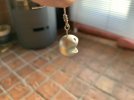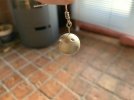purplepepper8
Member
Hi,
I'm working on making hollow domes like this
and was wondering if You'll know of any way I can work harden them? These pieces are up to .5mm in thickness so should I go thicker to add more strength or will work hardening work? Dents form in he piece if its dropped and the flat portion also seems prone to bending, although I'm currently using pure silver for prototypes but will be making them in 18k gold.
What would be the best way to keep the inside of the dome clean through the soldering process because I don't know if it can be cleaned once it has been soldered.
Would using a tumbler help with either of, or both of these issues? (I don't currently have one so will have to buy one).
Thanks
I'm working on making hollow domes like this
What would be the best way to keep the inside of the dome clean through the soldering process because I don't know if it can be cleaned once it has been soldered.
Would using a tumbler help with either of, or both of these issues? (I don't currently have one so will have to buy one).
Thanks








